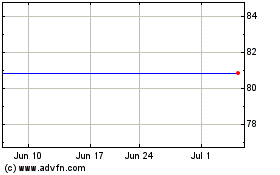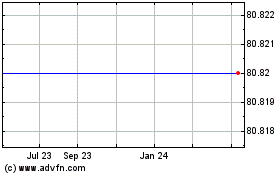BSX Grows US CRM Portfolio - Analyst Blog
December 01 2011 - 9:30AM
Zacks
Boston Scientific
Corporation’s (BSX) Cardiac Rhythm Management (CRM) should
record higher sales with the US Food and Drug Administration (FDA)
approving Incepta, Energen and Punctua cardiac resynchronization
therapy defibrillators (CRT-Ds) and implantable cardioverter
defibrillators (ICDs). These devices are meant to treat heart
failure and sudden cardiac death.
Though expected, the US approval
comes even earlier than the company’s original guidance of late
2011 or early 2012. CE Mark approval for these defibrillators was
received in the second quarter of 2011. The company is confident of
the ready adoption of these devices as they come with improved
therapy options, advanced battery longevity and a DF4 universal
connector system. The company also announced an extended warranty
for these devices in the US and many international countries of up
to 10 years. The latest approval is all the more significant as
declining sales of ICD’s and drug eluting stents (DES),
contributing more than 40% of total sales, have been a major area
of concern.
During the most recent quarter,
worldwide ICD sales declined 11% year over year to $360 million
(14% down at CER) with a 20% decline in the US sales to $225
million and a 7% rise in international sales (down 2% at CER) to
$135 million. The contraction in the US ICD market is because of
several factors – pricing pressure, physician reaction to study
results published by the Journal of the American Medical
Association regarding evidence-based guidelines for ICD implants,
US Department of Justice (DOJ) investigations into hospitals’ ICD
implant practices, the expansion of Medicare recovery audits and an
ongoing physician alignment to hospitals.
Moreover, according to the
company’s assumptions, the US ICD market weakened further in July
and August compared to the second quarter. Although the situation
improved marginally in September and early October, the company
needs another couple of quarters to assess if the market has indeed
stabilized.
A similar scenario is observed at
other major ICD players namely St. Jude Medical
(STJ) and Medtronic (MDT). Recently, St. Jude
Medical has received FDA approval for its much awaited Unify Quadra
CRT-D and Quartet Left Ventricular Quadripolar Pacing Lead,
shipment of which is expected to begin shortly.
Approval of the new devices is a
huge breakthrough for both Boston Scientific and St. Jude Medical
with the potential to turn around the ailing ICD business. Earlier
this year, Medtronic had received approval for its next generation
Protecta ICD, capable of partially offsetting pricing pressure.
The approval of the new line of
ICDs for Boston Scientific comes on the heel of US approval of
Promus Element Plus stent last week, well ahead of the company’s
original expectation of a mid-2012 approval. Promus Element now
represents $200 million in additional annualized gross margin
contribution from the US and Japan by 2012 end.
Besides, the next generation
Ingenio family of pacemakers is slated for launch in the US and
EMEA in the first half of 2012, subject to regulatory approvals.
The string of recent and impending approvals is expected to support
the company’s growth in 2012 fired by new product launches.
We have a Neutral recommendation on
Boston Scientific, in line with the short-term Zacks #3 Rank
(Hold).
BOSTON SCIENTIF (BSX): Free Stock Analysis Report
MEDTRONIC (MDT): Free Stock Analysis Report
ST JUDE MEDICAL (STJ): Free Stock Analysis Report
Zacks Investment Research
SJM (NYSE:STJ)
Historical Stock Chart
From May 2024 to Jun 2024

SJM (NYSE:STJ)
Historical Stock Chart
From Jun 2023 to Jun 2024
